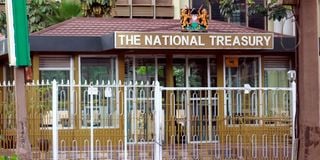Premium
Treasury misses short term debt swap target

The National Treasury Building in Nairobi.
Investors bid for only 60.25 percent of Treasury bills and bonds that the government was offering to swap with a longer-term infrastructure bond to lower its immediate debt-servicing costs.
The National Treasury was seeking to swap Sh87.8 billion worth of short-term debt with longer-term debt to create breathing room to fund the government’s growing spending needs amid a tight fiscal environment.
The Central Bank of Kenya (CBK) now shows bids totaling Sh52.9 billion were received from investors by the deadline of November 30. The CBK will now swap just Sh47.75 billion of the government securities falling way short of the target dealing a blow to efforts by the Treasury to spread its debt repayment obligations over a longer tenure.
“The specific features of the Bond(s), that is the tenor, amounts, coupon rates, and issue terms will be provided in the prospectus before the issue date,” the CBK said yesterday.
Treasury bills
The CBK was seeking to raise the amount from investors who are already holding Treasury bills issue numbers 2494/91, 2454/182, 2380/364, and Treasury bond issue number FXD1/2021/2.The debts mature in 91 days, six months, one year, and over two years respectively.
The underperformance signals reticence by investors to postpone cashing in on their short-term investments in government securities amid rising inflationary pressures.
Inflation remained at a high of 9.5 percent in November, according to data from the Kenya National Bureau of Statistics (KNBS).
Nearly half (47.12 percent) of the State’s local debt is owed to banking institutions, 32.97 percent is owed to pension funds, 7.37 percent to insurance companies, 6.2 percent to parastatals, and 6.34 percent to smaller investors including individuals.
Income from these securities forms a significant part of the earnings for these institutions.
The debt swap comes at a time the government is running on empty amid high debt repayment obligations, growing subsidy expenditure to ease the burden of the high cost of living, and rising spending on development projects.
Sh43.9 billion
President William Ruto’s government spent Sh43.9 billion in the first quarter of the financial year 2022/23 on subsidies, mainly on fuel and fertiliser, nearly twice the Sh22.2 billion that was budgeted for subsidies for the entire fiscal year.
Data from Treasury shows the government is expected to service Sh461.4 billion in redemptions and Sh553.4 billion interest on domestic debt in the current financial year. The latest issuance comes shortly after an infrastructure bond through which the government has raised Sh94 billion against a targeted Sh65 billion, indicating a high appetite for debt from the domestic market.
Kenya’s stock of domestic debt currently stands at Sh4.37 trillion, of which Sh691 billion is held in Treasury bills and Sh3.6 trillion in bonds. The country has Sh8.7 trillion of both domestic and external debt, equivalent to 62 percent of the Gross Domestic Product.





